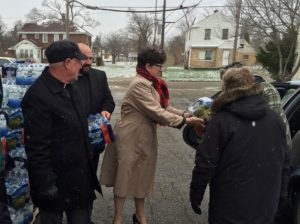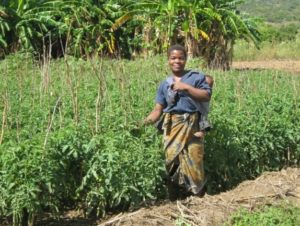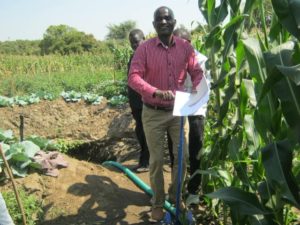The story of Advent is a story of hunger—a people’s hunger for salvation, the fleeing holy family’s hunger for safety, and the world’s hunger for a new day. It is a season when we await the one who will “give light to those who sit in darkness and in the shadow of death” (Luke 1:79a). Advent hope draws us into the world as people of promise, people for whom the “shadow of death” cast by deep hunger and poverty around the world is not God’s final word to God’s people. In Advent, we reflect on how far the Lord has led us and how far we have yet to go toward a world in which all are fed. As we prepare for the arrival of God’s Son, this season offers an important opportunity to reflect on the mystery and excitement of the promise from God.
This Advent, we invite you to journey with ELCA World Hunger through the scripture readings for this season. This study takes us through each week of Advent with devotions based on the lectionary, questions for reflection, prayers and hymn suggestions. The study can be used as a guide for worship, adult study forums or personal devotions at home. Blessings related to our church’s response to hunger and poverty are also included.
Each week’s theme:
- Shared vulnerability (Matthew 24)
- The “good fruit” of repentance (Matthew 3)
- Care for creation (Matthew 11; Isaiah 35)
- Finding God in unexpected places (Matthew 1)
The Advent study is available for download in English here (http://download.elca.org/ELCA%20Resource%20Repository/WH_Advent%20Study.pdf?_ga=1.241313474.1341912399.1476461047).
Questions, comments or feedback on the resource can be directed to hunger@ELCA.org. For more ELCA World Hunger resources, visit ELCA.org/Hunger/Resources.
May you and your community be blessed, enriched and challenged by this Advent resource, and may the stirrings of the season take root within you.
La historia del Adviento es una historia de hambre—el hambre de salvación de un pueblo, el hambre de seguridad de la sagrada familia y el hambre de un nuevo amanecer del mundo. Es una época en la que esperamos a aquél que dará “luz a los que viven en tinieblas, en la más terrible oscuridad” (Lucas 1:79a). La esperanza del Adviento nos introduce en el mundo como un pueblo de promesa, para el que “la más terrible oscuridad” proyectada por el hambre y la pobreza profunda en todo el mundo no es la última palabra de Dios para su pueblo. En el Adviento reflexionamos sobre qué tan lejos nos ha guiado el Señor y qué tan lejos nos queda aún por avanzar hacia un mundo en el que todos sean alimentados. Mientras nos preparamos para la llegada del Hijo do Dios, esta temporada ofrece una importante oportunidad para reflexionar sobre el misterio y emoción de la promesa de Dios.
Este Adviento, te invitamos a un recorrido junto con el Programa de la ELCA para Aliviar el Hambre Mundial a través de las lecturas de las Escrituras para esta temporada. Este estudio nos lleva por cada una de las semanas del Adviento con devocionales basados en el leccionario, preguntas para la reflexión, oraciones y sugerencias de himnos. El estudio puede servir como guía para la adoración, en foros de estudio para adultos o para devocionales personales en el hogar. También se incluyen las bendiciones relacionadas con la respuesta de nuestra iglesia al hambre y la pobreza.
El tema de cada semana:
- Vulnerabilidad compartida (Mateo 24)
- El “buen fruto” del arrepentimiento (Mateo 3)
- El cuidado de la creación (Mateo 11; Isaías 35)
- Dios en lugares inesperados (Mateo 1)
Este estudio está disponible en español. Puedes descargar la versión en español aquí (http://download.elca.org/ELCA%20Resource%20Repository/WH_Advent_Study_esp.pdf?_ga=1.241435074.1341912399.1476461047).
Las preguntas, comentarios o sugerencias sobre el recurso se pueden dirgir a Hunger@ELCA.org. Para consultar más recursos sobre el Programa de la ELCA para Aliviar el Hambre Mundial, visita ELCA.org/Hunger/Resources.
Que tú y tu comunidad sean bendecidos, enriquecidos y desafiados por este recurso de Adviento, y que el espíritu de esta época se arraigue en sus corazones.






